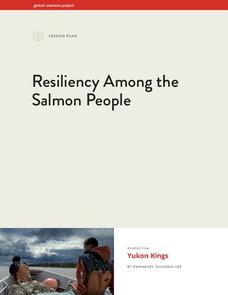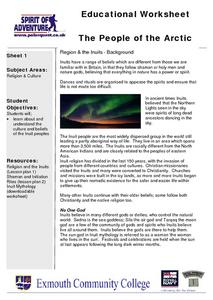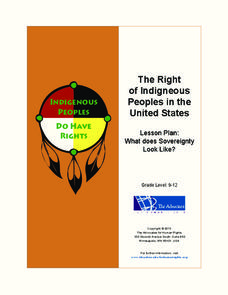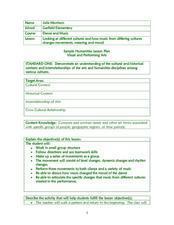National Endowment for the Humanities
People and Places in the North and South
North and South: two opposite directions and two opposite economic and social systems in time of the Civil War. Pupils peruse census websites and primary source photographs to understand what life was like for the everyday person before...
Curated OER
Differences in Opinion
Learners get together in small groups to create a set of rules, such as how to respectfully express one's opinion, and how to respect other people's opinions, even if they differ from you own. Everyone role-plays, and attempts to use the...
Facing History and Ourselves
Responding to Difference in Democracy
Disagreements happen in a diverse democracy. It's what people do about these differences in a diverse society that the resource models. After listening to an eight-minute podcast about a woman who collaborated with people who have very...
Global Oneness Project
Resiliency Among the Salmon People
Is losing cultural traditions the cost of social progress, or should people make stronger efforts to preserve these traditions? High schoolers watch a short film about the native Yup'ik people in Alaska and how they handle the shifts in...
Facing History and Ourselves
Life for German Youth in the 1930s: Education, Propaganda, Conformity, and Obedience
The German youth faced an onslaught of propaganda when they went to school, thanks to the Nazi regime led by Hitler during World War II. Pupils relate their education experiences to German youth by analyzing primary source readings,...
Constitutional Rights Foundation
Refugees from the Caribbean: Cuban and Haitian “Boat People”
Should refugees fleeing poverty be allowed the same entrance into the United States as those fleeing persecution? High schoolers read about US foreign policy in the late 20th century regarding refugees from Cuba and Haiti, and engage in...
Mary Pope Osborne, Classroom Adventures Program
Mummies in the Morning Egyptian pyramids, hieroglyphics
Visit the Magic Treehouse and take your class on a trip through time with a reading of the children's book Mummies in the Morning. Using the story to spark an investigation into Egyptian culture, this literature unit engages...
Curated OER
People of the Arctic
Read to learn all about the religion and belief systems of the Arctic-dwelling Inuits. This resource includes an easy-to-follow reading passage that is seven paragraphs in length, and five great critical thinking questions.
National Museum of the American Indian
The Kwakwaka'Wakw: A Study of a North Pacific Coast People and the Potlatch
Discover the cultural practices and unique value systems of a group of native peoples from Canada called the Kwakwaka'wakw. Your young historians will discuss how conceptions of wealth can vary and how these native people utilized...
Roy Rosenzweig Center for History and New Media
Differences Among Colonial Regions
Classes look at and analyze primary source images to explore the differences between the colonial regions during the Revolutionary era. They break into groups to tackle each region and then present their findings to the class. A final...
New York City Department of Education
Geography and Early Peoples of the Western Hemisphere
Young historians discover the early people of the western hemisphere. The unit explores how the land changed, how it was used and homes of early Americans such as Incas, Mayans, Inuits, Aztecs, and Pueblos. Individuals also examine these...
Advocates for Human Rights
The Right of Indigneous Peoples in the United States
The sovereignty of U.S. Native American nations is the focus of a resource that asks class members to compare the Right to Self-Determination in the UN Declaration on the Rights of Indigenous Peoples with a fact sheet that details the...
Anti-Defamation League
‘Migrant Caravan’ and the People Seeking Asylum
The controversies surrounding migrants seeking asylum in the U.S. have recently been a hot topic. To understand some of the issues involved, young scholars investigate the Migrant Caravans of 2018. A 10-page packet, including photos, a...
Curated OER
Respecting the Differences of Others
Fifth graders discover the importance of respecting the differences of people around the world in different situations in order to avoid conflict and promote peace. Students compare the sounds of a symphony and the instruments creating...
Queen's Printer for Ontario
Evaluating Wartime Posters: Were They Good Propaganda?
"Back Him Up!" Scholars will analyze how World War I posters displayed, on the home front, often attempted to stir up emotions. As they examine the different ways people used propaganda posters during the war, they will create their own...
Breaking News English
More People to Stick to New Year's Resolutions
What makes a good New Year's resolution? Practice goal-setting and reading comprehension with a set of language arts activities. English learners work on cloze passages, synonym matches, interviewing exercises, and comprehension...
Curated OER
9/11 Backlash: Being Muslim In America
Discover the experience of being Muslim in America. In this diversity lesson, watch "9/11 Backlash: Being Muslim in America," and research how Muslims are portrayed in American television and movies. Debate the media portrayal of Muslims.
Teaching Tolerance
Using Photographs to Teach Social Justice | Affirming Our Commonalities and Differences
Photos can challenge stereotypes. To gain an understanding of the big picture, groups examine a series of photographs and analyze how a photographer's choices can shape a viewer's reaction to an image. For the first set of photographs,...
C-SPAN
Primary and Secondary Sources: Trailblazers in Congress
Trailblazers forge the path into uncharted territory, they establish a precedent for others to follow. Young historians research trailblazers in Congress using primary and secondary sources to profile outliers that changed the face of...
Oxfam
Sweatshops - Exploitation Is Never in Fashion
Here's a resource that brings home the idea that we are all part of a global community, that our actions have far reaching consequences. Class members examine the labels in their clothes, create a list of the manufacturers, the countries...
Smithsonian Institution
Who's in Camp?
Pupils complete readings, a group activity using cards, and a writing activity to better understand people's lives during the American Revolution. The resource emphasizes people such as the militiamen, women, officers, and children,...
Media Education Lab
Propaganda in Context
"Board Game Helps Fight Real World Ebola," a video produced by Voice of America, provides the text for a guided instructional activity that asks viewers to analyze the propaganda techniques used in the video. Groups then select a example...
Annenberg Foundation
Rhythms in Poetry
Rhyme, rhythm, free verse, imagery: Do these words describe poetry, or jazz music? The answer is both! A resource explores these similarities as scholars watch a video, engage in discussion, read author biographies, write poetry and...
Curated OER
Looking at different cultures and how music from differing cultures changes movements, meaning and mood
Each of the three dance lessons included here will get your class moving. The first lesson allows learners to explore how music and movement differ in meaning depending on cultural context. Lesson two gives them an opportunity to create...

























